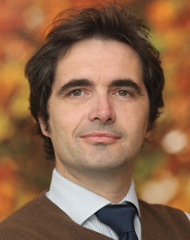The European Commission awards the University its first coordinated project H2020 at Humanities in the programme 'Science with and for Society'.
Led by the Institute for Culture and Society and endowed with 1.2 million euros, it will address with an interdisciplinary approach the field of assisted human reproduction in Europe.

PHOTO: Manuel Castells
The European Commission has awarded the University its first coordinated project in the area of Humanities in its H2020 Call, in the framework of the program 'Science with and for Society' (SwafS) program. Endowed with 1.2 million euros, it is led by the researcher of the Institute for Culture and Society (ICS) Francisco Güell.
The project is entitled 'Be Better Informed About Fertility. Giving voice to citizens towards improving assisted reproduction technologies for society(B2-InF)' and will address with an interdisciplinary approach the field of assisted human reproduction in Europe.
Through semi-structured interviews, it will collect and analyse the scientificknowledge , expectations and concerns of young people about the science of human reproduction. B2-InF will also focus on what subject information clinics provide to society and how it can be improved.
The study will be carried out in Belgium, Switzerland, Italy, Spain, Macedonia, Albania, Slovenia and Kosovo, which have very different social and legal realities in this field.
"The European Commission has valued the proposal with a 100 out of 100, something truly unusual in calls of maximum international skill ", highlights Francisco Güell. He specifies that he has been maturing the idea since a work that he presented in 2013 and was published, after going through eight reviewers, in 2017.
"More than as a punctual project , I have experienced its preparation as something necessary to fulfill what I am called to do: to serve the entire community involved in assisted human reproduction: professionals, patients, governments, and above all, the unborn child," he says.
Biolegal analysisHis participation in the project, in addition to coordination, is linked to guiding the biolegal analysis. "The development of the early embryo has been my object of study for more than ten years, and with the rise of assisted human reproduction techniques, I have been interested in how the techniques may be affecting the development of the unborn child and the health of those who are born," she indicates.
In this sense, he comments that he has introduced in the academic community "the need to look at the practice of the techniques from the perspective of responsibility, both of the users of the clinics (parental responsibility), as well as of the professionals and society".
The ICS researcher highlights that B2-Inf has a consortium of 10 partners, who make up "a first class team". He details that, although they have diverse profiles, their global vision will allow him to adequately orient the efforts of each one to direct them towards the objectives of project.





